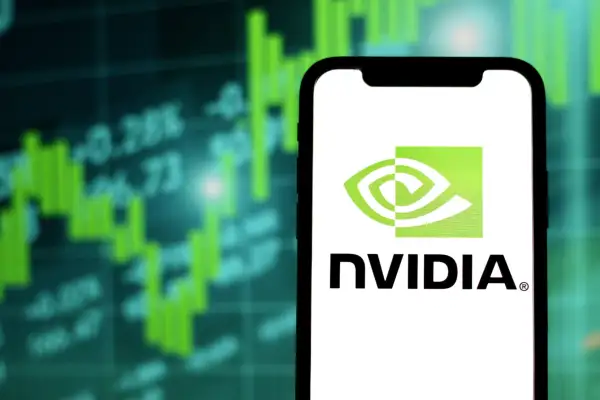Nvidia's CEO Is Selling Millions in Company Stock. Is the AI Bubble About to Burst?
Money is not a client of any investment adviser featured on this page. The information provided on this page is for educational purposes only and is not intended as investment advice. Money does not offer advisory services.

In the past month, the CEO of Nvidia — the third-largest company in the S&P 500 and darling of the AI stock boom — has been liquidating hundreds of millions of dollars worth of his shares.
It's such a massive, high-profile selloff that retail investors may be wondering if they should scale back their positions to safeguard against a potential pullback not just for Nvidia but all tech stocks benefiting from AI hype.
From June 13 to July 10, Jensen Huang, the president and chief executive of Nvidia, sold more than 2 million NVDA shares in increments of 120,000, according to financial visualization platform Finviz, which tracks the trades of company executives and directors via SEC Form 4 filings.
Through Form 4, the public is made aware of insiders' various transactions in company securities, including the amounts bought or sold, and the price per share at the time of the transaction.
The value of the shares offloaded by Huang is estimated to be around $250 million, and the window in which it was executed coincides with analysts' claims AI stocks' valuations being overinflated. As he and other high-ranking members of the company cash in their shares — raising the specter of a potential AI bubble bursting — here's some context average investors should consider in order to protect their portfolios and shape their strategies in the near and medium terms.
AI stocks have been surging
For the past few years, AI has begun infiltrating numerous aspects of everyday life, from content creation and autonomous cars to software development and investing.
Subsequently, companies operating in those spaces — and AI-adjacent industries like semiconductors — have seen their valuations skyrocket. By no means is the following list of companies operating in the AI space exhaustive, but it provides a sampling of microchip manufacturers, cloud-computing businesses and others that've seen share prices rise exponentially in the recent past.
Over the past two years:
- Oracle is up 110%.
- Taiwan Semiconductor Manufacturing Company is up 116%.
- Advanced Micro Devices is up 123%.
- And Arista Networks is up 297%.
However, it's Nvidia's performance that has turned heads over the same period as the stock gained 710% since July 15, 2022. Earlier this year, the company briefly surpassed Apple as the second-largest publicly traded company and currently boasts a market cap of $3.21 trillion.
Overvaluation of the tech sector
Huang isn't the only executive reaping the rewards of his company's surging stock price. It's a fairly common practice for executives to sell their preferred stock and lock in enormous gains. For example, former Amazon CEO and current executive chairman Jeff Bezos has been on a selling spree: In July alone, he cashed in more than 8.2 million shares of AMZN at an estimated value of $1.355 billion.
Investors shouldn't assume that Huang and Bezos's selloffs signify their company's stock prices are about to crash. However, analysts are concerned about the tech sector's overinflated valuations and how that has resulted in elevated market concentration.
Nvidia accounts for 6.74% of the S&P 500 by weighting, with Amazon fourth on the list at 3.78%. Right now the top six companies in the benchmark index — with Microsoft, Apple, Meta Platforms and Alphabet joining Nvidia and Amazon — account for nearly 30% of the entire S&P 500.
In other words, the portfolios of many investors may be insufficiently diversified, and they're at heightened risk of suffering losses if these big tech stocks suddenly crash.
Analysts' AI stocks outlook
Last month, Morningstar published its market outlook for 2024's third quarter with a stark warning for long-term investors. After noting that "[a]nything related to artificial intelligence continued to surge in the second quarter," the report stated: "While a rising tide can lift overvalued AI stocks even further into overvalued territory in the short term, in the future we think long-term investors will be better off paring down positions in growth and core stocks, which are becoming overextended and reinvesting those proceeds into value stocks, which trade at an attractive margin of safety."
While a potential AI bubble might not mirror March 2000's dot-com crash, it's best for investors to never be overexposed to one particular industry, sector or asset class.
"These [bubbles] historically end badly," James Ferguson, founding partner of the U.K.-based firm MacroStrategy Partnership, said on an episode of the podcast Merryn Talks Money with Bloomberg reporter Merryn Somerset. "So anyone who's sort of a bit long in the tooth and has seen this sort of thing before is tempted to believe it'll end badly."
While AI as an industry is nascent and still presents tremendous long-term opportunities, overvaluation could lead to significant losses that result from near- and medium-term volatility as those companies' valuations come down to Earth. One defensive measure investors should take is embracing diversification among their portfolio holdings.
"Considering that AI stocks are generally at best fairly valued and at worst overvalued, we see much better opportunities elsewhere in the market," the Morningstar report added. "[S]pecifically in the value category, which remains the most undervalued according to our valuations."
More from Money:
Fool's Gold? Walmart Is Selling Snoopy and Darth Vader Coins for Thousands of Dollars
5 Best Stock Trading Apps of 2024
Could Germany’s Plan to Sell Over $2 Billion in Bitcoin Affect Crypto Prices?

